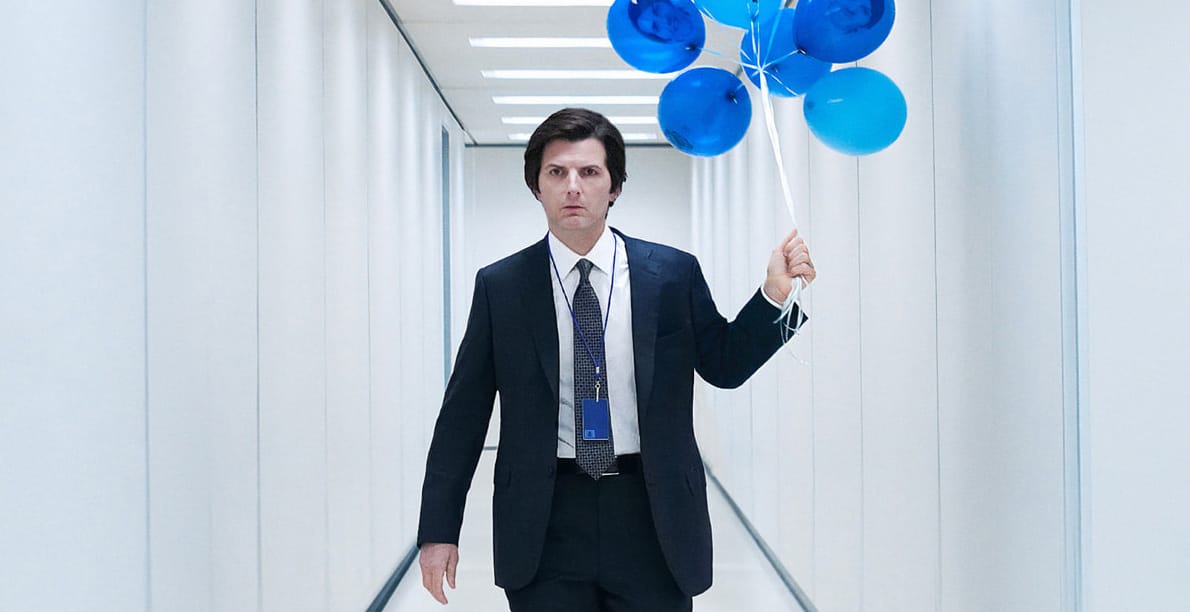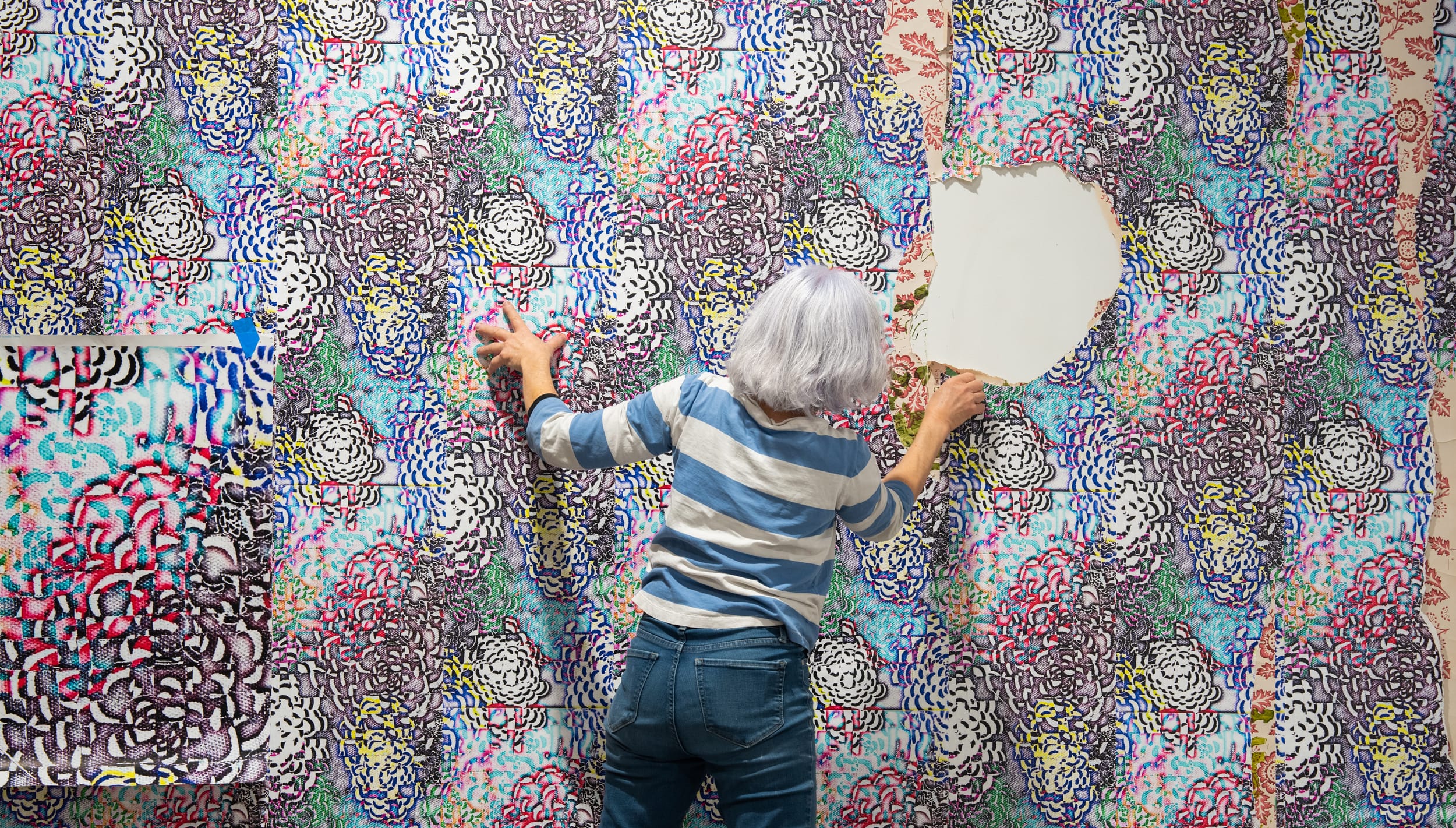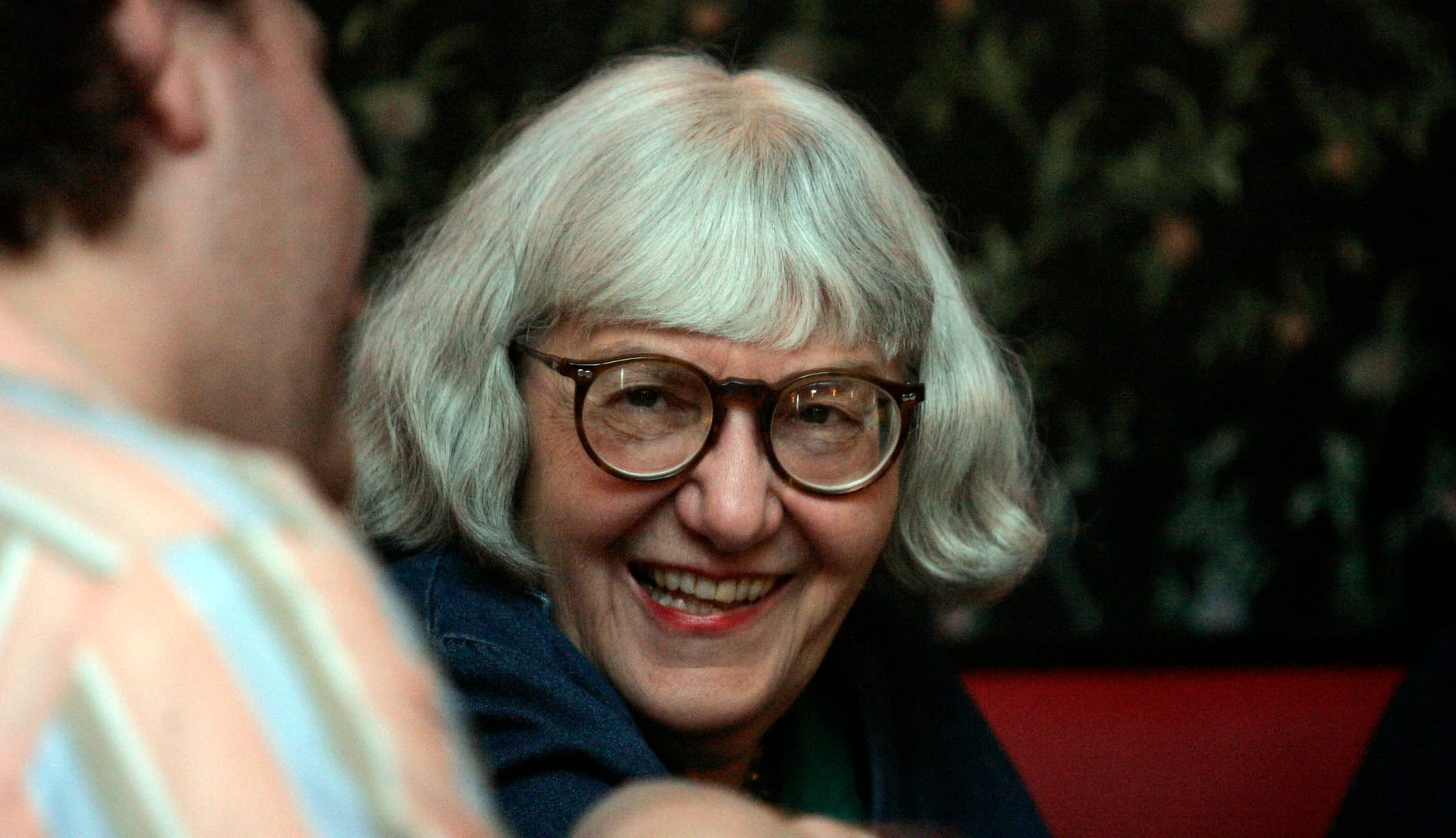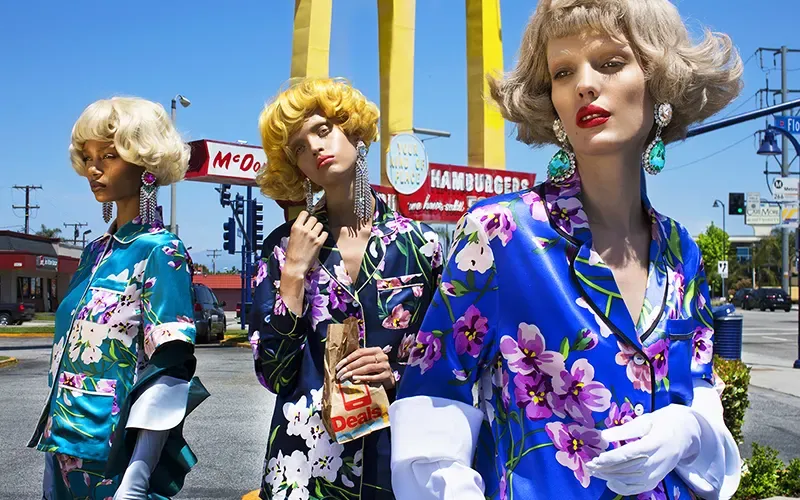Severance, My Doppelganger, and Me
The doubles and divided selves who populate the world of Severance are no less fragmented than the ones we inhabit everyday. Carl Wilson unravels the TV show's eeriest truths.

(Note that this article contains spoilers.)
“We need a certain kind of person here,” a prospective employer tells an interviewee, “not a certain kind of two people.”
That sentence could come only from Severance, the AppleTV show that makes literal the “split” between work and personal life, like novelist Colson Whitehead re-imagining The Underground Railroad as an actual magical train for escaping slaves. In Severance, which just finished its second season, some workers at the mysterious megacorp Lumon volunteer to have a chip implanted in their brains that induces a total amnesia about their regular lives while at the office, and blocks all memory of work when they’re not. Their consciousness is severed in two between an all-work “innie” and an all-play “outie.” The show follows both sides of their subsequent lives, joining tales of doubles and doppelgangers from R.L. Stevenson’s Dr. Jekyll and Mr. Hyde to Philip Roth’s Operation Shylock, Octavia Butler’s Kindred, and Jordan Peele’s Us.
The show’s neurology consultant Vijay Agarwall claims severance is quite scientifically plausible, by the way, and the idea is initially appealing—not only never bringing work home, but never experiencing that stress and drudgery in the first place. It only dawns gradually on viewers that this entails creating a second self who never rests, and never has any non-work human contact. As an innie, after boarding the elevator to head home, you instantly find yourself in the elevator arriving the next morning. It’s a never ending 9-to-5, a Kafkaesque joke of self-enslavement. And if you get mistreated at work, you have no way of telling anyone, unless it leaves a mark for your outie to see.
Not everyone in the Severance universe approves, including that boss at another company who won’t hire “a certain kind of two people,” meaning anybody previously severed. The irony—and Severance’s first, clearest layer of allegory—is that just by being a boss, he’s figuratively prompting people to split their personalities all the time. The applicant in the interview instinctively begins making up a new self to seem like a better fit: He says he’s always loved doors, which is what the company manufactures (his favourite? “Pocket”), and feigns curiosity about kickball, the company’s group extramural activity. But if he got the job, he might end up getting way into kickball, and likely would become more genuinely interested in doors as his knowledge grew; he might start boring his family by rambling on about panels and mullions. Almost certainly he’d adjust how he dresses and talks at work, and at least partly how he thinks, to get by in the company culture, and before long find it jarring if a new hire crossed those lines.
The employer’s wish to hire only single-sided people is doomed because, as philosophy, psychology, and neuroscience increasingly agree, there’s no such thing as a unitary, continuous self. To be human is to be adaptive, to fragment and schism, to express different traits in different contexts, and to be divided between contradictory (and not always conscious) urges and desires, between foggy memories and improbable aspirations, and between the values we profess and the expectations we absorb from peers and the changing zeitgeist, among myriad other influences. We ping-pong between these potentials.
Self-help literature is full of supposed cures for this condition, to help us be our best or most productive or deepest “authentic” self all the time. Severance knows that’s a joke, finding comic relief in Rickon, the author of a fat tome titled The You You Are. This self-actualization guru is immediately open to self-revision when Lumon comes offering fame and wealth, so long as he makes certain adjustments to his text that advocate the exact opposite of the original. He rationalizes that this is just a “Trojan’s horse” for conveying his “real” message to the severed masses—if anything remains of it.
Creator Dan Erickson conceived the series while working a data-entry job in an actual door factory, but he was also going through a bad breakup. He found himself grateful to have even this dull routine as an escape from his heartbroken feelings every day. And as the show goes along, love becomes another theatre of self-transformation it starts exploring. The protagonist Mark becomes severed in the first place for partial relief from grief over the death of his wife, but his innie later falls for another innie, as do several other innie characters, even at odds with their outies’ own wills and ties. (One outie’s wife even meets and falls for his own innie, putting him in a love triangle with himself.) Having an affair can be like that—a way to feel like a whole other person, the guilt often limited by the sensation that the two relationships take place in two unrelated worlds. The polyamory movement is partly an attempt to reckon more ethically with the commonplace wish to leave and stay simultaneously, though things still seem to get messy.
Even in more conventional serial monogamy, the feeling of multiplicity is common—like finding it impossible to comprehend that you’re the same person who was in a past relationship with someone who seems obviously wrong for you now. Or that you will ever do it again: In the song “Future Me Hates Me” by New Zealand band The Beths, singer Liz Stokes starts by swearing off love altogether, but then admits there’s “something about you” that makes her dare to risk “future heartbreak, future headaches/ wide-eyed nights late, lying awake/ with future cold shakes from stupid mistakes/ future me hates me for.”
That’s just one of the endless causes “future you” might have to be pissed off: hangovers, procrastination, social faux pas, bad eating and sleeping choices, poor career decisions, impulsive behaviours of all kinds… Mark on Severance develops a drinking problem after his wife’s death, and addiction is an especially potent splitting agent. People act in ways that seem alien to themselves under the influence of a substance or a compulsion: If you asked a gambling addict outside of the context of a game whether they were going to, for example, bet their car or their house, they’d surely say, Absolutely not. That would be crazy. Hours later, in the grip of the mania, they lay their keys on the table. Meanwhile, other parts of the self are always covering up for and facilitating the inner addict.
Maybe the soundest self-help advice would be to try to be the best possible agent of future you’s interests, and the future world’s, for that matter. But that might result in becoming too overcautious and risk averse. You don’t actually have access to future you, so you’d just be guessing what they wanted. Unless, that is, you’re in the charming 2024 fantasy-dramedy My Old Ass by Canadian director Megan Park, in which an 18-year-old living on a Muskoka cranberry farm (Maisy Stella) encounters her 39-year-old self (Aubrey Plaza) during a mushroom trip. Plaza refuses to give Stella any specific advice except to avoid getting mixed up with a certain boy. Which of course is exactly what Stella then rushes headlong to do, in spite of her selves.

After relationships, you might also look back to see that your interests and opinions bent somewhat to be more compatible with a past partner. Love can be like joining a cult of two. And conversion experiences of various kinds—religious, political—are another radical means of dividing the self into a before and after. One character on the series became severed because he had a past as a “scoundrel,” and his theologically innovative Lutheran pastor suggested that innies might have independent souls that could get into heaven separately. Little did he know (spoiler alert) that Lumon is internally a secret patriarchal ancestor cult, to which it converts its severed workers (praise Kier). Another character (non-severed) is trying to go all in on those Lumon doctrines, but keeps running up as a Black man against its barely concealed white supremacy, including some co-workers’ dislike of his ornate vocabulary. This brings up the whole question of racial “code switching,” changing your manner and vocabulary with members of the socially dominant group from what you would use in private with your own group. W.E.B. DuBois named the perceptual framework for this as a form of “double consciousness” as far back as 1903’s The Souls of Black Folk, and it was the core subject of Percival Everett’s Huckleberry Finn rewrite James, which won the National Book Award last year.
Then there’s your longtime friend or relative who’s been converted to MAGA or anti-vax or some other ideological in-group. They might even have glommed onto a cause you agree with, just with a disturbing monomaniacal zeal. They don’t seem like the same person anymore, and they spurn your efforts to counter their misinformation because, according to social scientists, the desire to maintain a feeling of belonging with a chosen tribe easily overwhelms most people’s susceptibility to reason. At its worst, this is how “good Germans” can end up complicit with Nazis: When the balance of opinion shifts in a society, the majority tends to jostle itself from side to side, to adhere to the new logic—the underlying dynamic of what political scientists call the Overton Window. And when it shifts back, there’s an impulse to deny you were ever part of it—that everyone was in the French Resistance, or that you never supported the invasion of Iraq. The political correlates today are too obvious, and not just in the U.S.
The very concept of “split personality,” a.k.a. multiple personality disorder, is ironically enough a good example of how society generates and mothballs various kinds of selves in different periods. That’s the focus of a famous 1986 study by the late Canadian philosopher of science Ian Hacking called “Making Up People.” The underlying etiology might have always existed, Hacking acknowledges. But there’s no question that after psychiatrists started diagnosing the condition, around 1970, more people began showing the symptoms. And those symptoms begat others, as therapists began soliciting them, such that instead of two or three alternate personalities, in later years the average patient would have 17.
In a 2006 London Review of Books article, Hacking summed up what he concluded from this: “In 1955, [‘multiple personality’] was not a way to be a person, people did not experience themselves in this way, they did not interact with their friends, their families, their employers, their counsellors, in this way; but in 1985 this was a way to be a person, to experience oneself, to live in society.” He added: “In 1986, I wrote that there could never be ‘split’ bars, analogous to gay bars. In 1991, I went to my first split bar.” This is part of what Hacking calls a “looping” effect, in which the claiming of a social or psychological category by the people it’s applied to start to alter the makeup of the category. He doesn’t assert that this is good or bad—the fact that for most of western history there was no idea of a “gay person,” only same-sex acts, doesn’t make LGBTQ liberation misguided—only that these historically situated “ways to be people” have real-world effects.
With satisfying symmetry, two of the other most-talked-about TV shows of the spring have also been dealing with this theme of selfhood. Writer-director Mike White’s The White Lotus on HBO is a satire of wealth and privilege, but it’s also the flip side of Severance—not about the self at work, but about the self on vacation. No matter how much the White Lotus characters spend or how far they fly to a week on a luxury resort, they bring their basic pathologies along with them. With this season set at a “wellness” spa in Thailand, the show looked at its hapless American tourists through a Buddhist lens, suggesting their over-attachment to their identities and the material trappings that go with them is their biggest obstacle to true freedom. What they need is a little spiritual severance.
The harrowing U.K. production Adolescence, meanwhile, is about the developing self under the influence of social media; its teenage protagonist seems to have committed a terrible crime because, under the radar of any adults, he’s been deranged by “manosphere” and “incel” propaganda about today’s supposed threats to manhood. His family can’t reconcile this outburst of violence with the smart, mild-mannered kid they think they know; neither can the child himself, who goes on denying it despite being caught in the act explicitly on CCTV. It’s enough to make you long for the severed floor at Lumon, where at least you can’t bring your phone.
There’s been some speculation that the terms innie and outie themselves might become lasting popular shorthand for work and non-work identities. In any case, Severance in many ways is the story of the innies attaining self-awareness as innies, as a way of being a person, and perhaps even a political category. (Because the innies start out childlike in their blank-slateness, it doubles as a coming-of-age story.) This plot turn leads to an ethical problem: It’s a given that the procedure was wrong in the first place, but undoing it means ending the existence of the innies—from their perspective, “killing” them. In season two, when one of our core group of innie protagonists is fired for an act of insubordination, the others insist on holding a funeral. (This question of a doppelganger’s right to exist also recalls the clones of Kazuo Ishiguro’s Never Let Me Go.)
The show has been toying (unsatisfyingly so far) with the possibility of a “reintegration” procedure, but afterwards, what if the innie part wants a whole other life than the outie part does? You might make analogies here to the looming question of our relationship with artificial intelligence: If AI entities were to achieve sentience, what would be our reciprocal obligations to them—and does that change if they’ve stolen our jobs, or were already out to kill us?
Then again, what determines the outcome now when there are conflicts about a decision between the work part of you and the family part, the hedonistic part, the religious part, the politically committed part, the nature-loving part, or some other component of your identity? The inner workings of politics, marketing, economics, and many other fields hinge on the fact that we never can be sure. In a sense that’s what every story is about.





